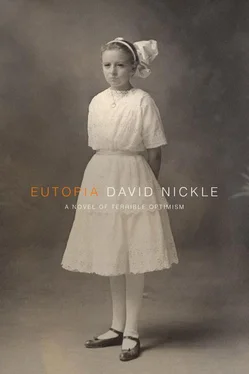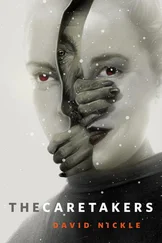“You know better.”
Norma laughed. “You’re hurt,” she said. “Not much trouble, and not much use either. Why don’t you sit down, Dr. Waggoner.” She motioned to a table with a couple of chairs.
Andrew sat. He liked this little house. It wasn’t exactly civilized—but held against the shack where Loo was staying, this was fine. It seemed cleaner, more orderly—and the rich smell coming from the stove promised a fine meal.
Norma pulled out a couple of metal plates and cutlery, and ladled the stew into them. She put one in front of Andrew, and watched as he set to it. It was delicious, and it warmed him through.
“You manage to get out of town without them killing you,” she said as Andrew spooned another mouthful.
He sat up, swallowed and looked at her. “Now why do you think they were going to kill me?”
“Look at you.” She pulled a small bone from her mouth and set it on the plate. “You di’n’t get that from fallin’ down a hill. Fact is, a nigger in that place shouldn’t have lasted any time at all. A doctor nigger? My.”
“Wasn’t a problem,” he said, “until the end.”
“Never is,” she said. “Not ’til the end.”
Andrew let out a breath, and leaned back. He thought he was coming back to himself, now the food was working its magic. More than anything, he wanted to go to sleep. But as he sat back, the question formed itself and he spoke it before he knew:
“What does ‘Feeger’ mean?” he asked.
Norma set down her spoon.
“Hank said it. Before I started the examination. He said, what was it?… get rid of it, before it eats her up—and turns all of you… Feeger .”
“He said that?” she said. “Maybe he meant feeble. Maybe he thinks it’s catching. Hank tends t’ mumble.”
“Mmm.” Andrew didn’t think that Hank had been mumbling. But he didn’t press her on it. “Faerie King. Was that more mumbling?”
Norma made a humourless smile. “You’ll think we’re crazed,” she said.
“No,” said Andrew, “I don’t think I will.” He waited for Norma’s reply, and when it didn’t come, he smiled and shrugged.
“Let’s finish eating,” he said. “How about that? When we’re done, I’ll help you clean up and then… I’ve something to show you.”
Andrew cleaned his plate and stowed the bones in the garden bin, and good as his word, after helping clean the dishes he went to the doorstep, where he’d stowed his doctor’s bag.
Norma watched with interest as he dug among the ampoules of morphine and jar of iodine, and finally pulled out the small glass jar that Jason had given him before he fled.
He brought it to candlelight. Norma drew close, squinted through the glass.
“Where’d you get these?” she asked.
“A woman,” said Andrew. “After she died. They were on the inside. In her womb.”
Norma took the jar from him and twisted open the top. She made a face as a whiff of formaldehyde came out, and before Andrew could say anything reached in and pulled one of the tiny spheres out on her fingertip. “Ah,” said Andrew, “best leave the rest.”
Norma nodded. “She alive?”
“No,” said Andrew. “I told you. She died.”
“All the way dead, I guess you meant. Well that’s too bad. No baby inside, then.”
“I—beg your pardon?”
“In years past, when the Faerie King took a bride, he left the mother half-dead when he done with her and her babe. That’s only if she’s already with child. Takes most from the baby, only a bit from ma. If she be barren…”
Andrew stepped back and stared. He must have been making a face to frighten children, for this grown woman took a look at him, set the jar down on next to the candle, folded her arms and stepped away.
“You want to sit down?” she said.
“If she’s barren,” said Andrew, putting together this story with what he’d found in the autopsy, “the Juke eats her from the inside, killing her completely.”
“The Juke?”
“The Faerie King,” said Andrew. He followed the notion further. Assembling it together with what he had observed in Loo’s cabin.
“Is that the trouble with Loo?” he asked. “She’s barren?”
Norma nodded. “Not born barren. But thanks to your hospital and that fine doctor there, she be so now.”
Andrew picked up the jar and screwed the top back on. “Norma,” he said, “I think it’s time to talk about Loo’s case in more detail. I’ll sit down now, if you will.”
Norma talked. And through the rest of the afternoon, at Andrew’s gentle prodding, they put together a case history of Loo—who’s proper name was Lou-Ellen Tavish, and who had never done a wrong thing in her life save on her birthday, when she killed her mama.
§
Her mama’s name was Rose, and she’d had three other children, all by her husband Will. That may have been part of the trouble. Rose was old, near forty, when she lay down with Will in the summer of 1894. It was winter when the child came due, and Rose was that much older, and more things went wrong than the midwife could make right. She bled to death on the earthy floor of their cabin, while Will held his quiet baby girl close at his coat and screamed blue murder to the rafters.
As the days wore on, old Will’s screams quieted, and little Lou-Ellen—she stayed quiet. Lou-Ellen didn’t cry in her blankets, she didn’t laugh or coo when her brothers and sister would wiggle their fingers at her. By the time she was two, everyone had worked out that Lou-Ellen had been born simple and she might never be able to look after herself. It led to some awful talk among the families, about how a girl ought to be able to pull her weight. But it was only talk and it didn’t go on for long. Lou-Ellen was kin, everybody’d liked Rose and only a few didn’t care for Will. So they all cared for Lou-Ellen as she grew. They fed her even when food was scarce, gave her hugs and played with her, and when she got so she could make some words, they rechristened her Loo, which was something she could say back.
She managed to make herself useful, too. By the time the folks from Eliada came, she was tending goats and cleaning kills and minding the garden patch.
There were three men that made the trip up the hill. Two of them carried Winchester rifles on their backs and made it clear that they were not to be trifled with. A third was a fat old doctor (when Andrew asked if the name Nils Bergstrom rang a bell, Norma thought that might’ve been it).
The doctor talked to a couple of them and said he was there to provide free medicine—that some people out east had decided it was a good way to spend their money, to make sure that folks who couldn’t afford it got properly looked after by doctors.
There were some in the families who were suspicious, but they were quiet about it. The two riflemen looked like they had other friends besides this doctor, and no one wanted to have those ones drop by. So the riflemen set up a tent and started inviting folk inside for examinations.
No one was sure what sort of conversation went on when Loo was in the tent, but others from the families reported that the doctor just asked a lot of questions, looked into their eyes and listened to their hearts with a stethoscope.
The doctor heard many complaints, but by the time he packed up his tent and headed back to town, he’d offered little to cure them that the family couldn’t figure for themselves.
He did, however, offer what he called “preventative medicine.” His last day there, he invited a few people back, who’d had no complaints at all. It was mostly the younger folk—Loo, her sisters and brothers, and the two boys. He was, he said, going to give them a special operation that would make it easier on them. Loo, he said, would go into the tent first.
Читать дальше









![David Jagusson - Fesselspiele mit Meister David [Hardcore BDSM]](/books/486693/david-jagusson-fesselspiele-mit-meister-david-har-thumb.webp)


